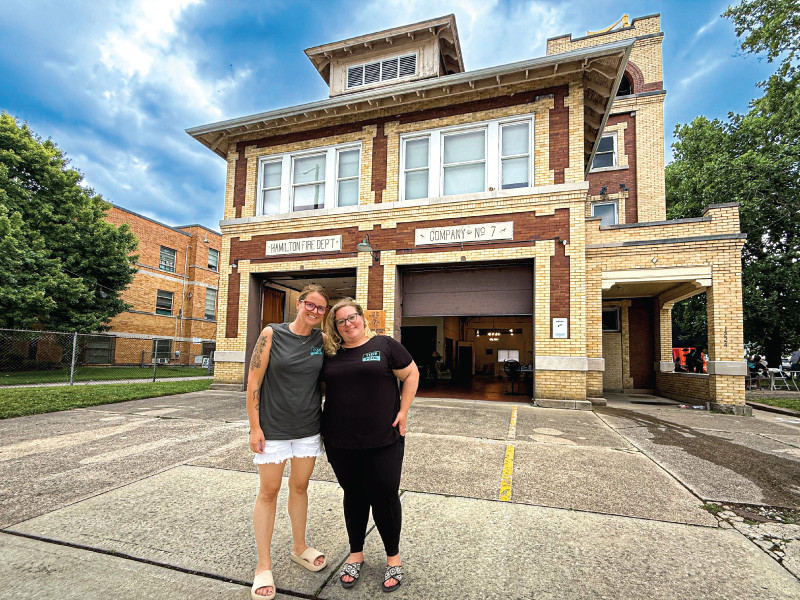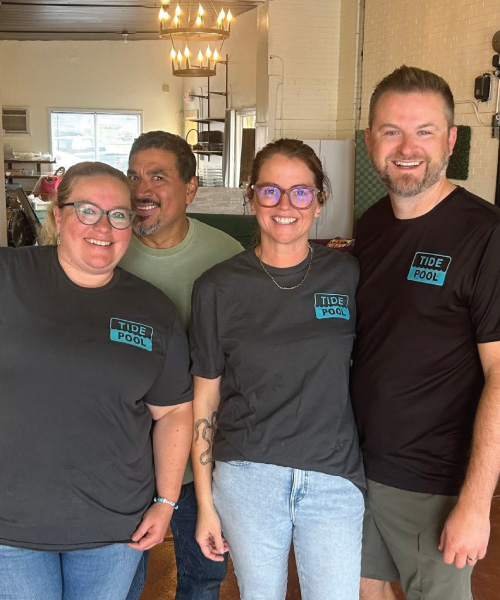Real-world partnerships help students develop skills through applied experience
Grant writing class works with Hamilton non-profit to research potential funding

Real-world partnerships help students develop skills through applied experience
As a former student in Miami University’s English 413: Grant and Proposal Writing, Kate Yerigan knows the challenges of learning how to write grants first hand. As the co-founder of the Hamilton nonprofit Tide Pool, she also knows how important they are.
That’s why she was quick to offer her organization as an official community partner for the class to give students a chance to see for themselves how the grant-writing process can impact real nonprofits like hers.
“I’ve been in their shoes,” said Yerigan, who graduated in August with a degree in Liberal Studies and is now working on her master’s in Entrepreneurship and Emerging Technologies. “I know what the class is looking for. I was glad to be able to offer a real-life organization that they could work with.”
Yerigan launched Tide Pool in late 2024 with business partner Heather Bernal after they purchased and renovated a historic firehouse in the city of Hamilton. Tide Pool is a branch of Wave Pool, a Cincinnati-based non-profit that connects communities, especially immigrant communities, through art.
Matthew Nunes, associate teaching professor of Languages, Literatures, and Writing and the instructor for the class, said students often feel a different sense of purpose when they work on real-world scenarios rather than the hypothetical situations that are typically part of class projects.
“The (assignment) is a different experience when their work could have a real impact,” he said. “It’s no longer just a school assignment. It’s the chance to make a difference for real people.”
Grant writing can be somewhat intimidating for students learning the craft for the first time, Nunes explained.
“They have no experience in anything like this,” he said. “It can feel daunting to begin the process, but writing for an actual situation makes it feel more realistic. There are real people connected with this organization. They feel more invested.”
Nunes said students work in groups on their grant proposals. With access to database information about potential grants, the students learn as much as they can about Tide Pool and its programs to determine the best grant opportunities. They collaborate with Yerigan to polish their proposal to give it the best odds of succeeding.
“It’s as close as they can get to being hired grant writers,” Nunes said. “They don’t actually submit the proposals, but Tide Pool could later decide to use their research to apply for the grant.”

Students in Nunes’ class said they are appreciative that this experience offers solid transferable skills toward future academic or professional goals.
“Searching for potential grant opportunities has strengthened my analytical thinking and refined my research skills,” third-year student Rachel McDaniel said. “In addition, collaborating with my classmates on drafting the proposal reinforced the importance of effective communication and teamwork in a professional setting. These skills will serve me well in my future career in publishing.”
Christina Lewellyn, a senior majoring in English Studies who plans to attend law school, said this project offers the chance to practice important teamwork and leadership skills.
“The skills that I learn in grant writing are applicable to (the law) field and in life at large,” she said. “Skills like collaboration, complex thinking, detailed reading of official or legal documents, and proposal writing, are all essential for my future success.”
Since the class is fully online, adding the gravity of a real-world scenario brings more of a sense of connection for the group, Nunes added.
“Sometimes hands-on learning can be harder in online classes. The element of a real person they can meet with and an actual organization they can work for brings more opportunities to develop the kinds of skills they’ll need when they graduate and face these same situations in the business world.”
Yerigan said she feels fortunate to be in a position to help students improve their skills, and if something more comes of it, whether through a possible grant or a potential future employee, even better.
“I’m really looking forward to seeing what they come up with,” she said. “But it’s really all about helping them grow as students. That’s the main goal.”
